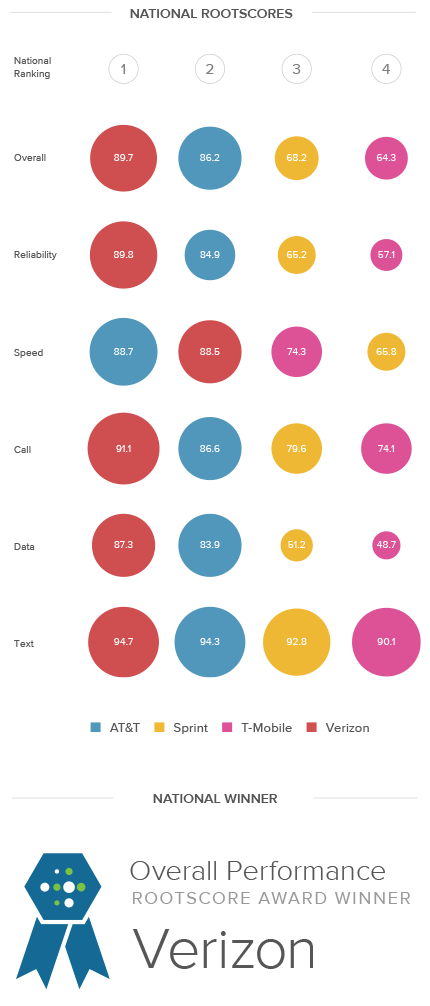The latest network report card from RootMetrics showed a clear win for Verizon Wireless, though rival AT&T Mobility came in a close second. More telling, the nation’s two largest operators scored well ahead of their smaller rivals Sprint and T-Mobile US.
The report, which RootMetrics claims is its first nationwide test, included both drive testing and in-door testing resulting in more than 4.6 million data points across 50 states, was conducted during the second half of last year. The test broke down results into reliability, speed, call, data, text and overall. The call and text results were reliant on the operators’ 2G and 3G network, while the reliability, data, speed and overall results were from a combination of 2G, 3G and LTE services depending on availability.
Verizon Wireless took the top honors in the overall, reliability, call, data and text categories, while AT&T Mobility managed the highest score in the speed category. All of the results were close, with Verizon Wireless topping AT&T Mobility by 3.5 points in the overall category, by 4.9 points in reliability, by 4.8 points in call, by 3.4 points in data and .4 points in text. AT&T Mobility squeaked out a .2 point victory in speed.
With those results, RootMetrics proclaimed Verizon Wireless “the nation’s most reliable network in our national results.” However, AT&T Mobility’s strong showing also garnered praise by the test firm.
“AT&T’s national performance stood out as well,” RootMetrics noted. “While AT&T finished second to Verizon in our RootScore Awards and in our reliability index, the scoring was tight. Even more notable, AT&T edged out Verizon and proved to be the nation’s fastest network in the RootMetrics speed index, our holistic look at how fast a network is across all of our data and text tests. This first place finish in our speed index is even more significant when you consider that Verizon actually offers broader LTE coverage: even without as much LTE, AT&T still prevailed in our look at overall network speed.”
While the two largest operators battled it out for overall honors, Sprint managed to out-score its smaller rival T-Mobile US in five of the six categories, though their overall results were in most cases well below those posted by Verizon Wireless and AT&T Mobility. Sprint’s No. 3 overall score was 18 points lower than No. 2 AT&T, while No. 4 T-Mobile US was 25.4 points lower than overall winner Verizon Wireless. Similar gaps were seen in the other categories, though the text category witnessed the closest battle with No. 4 T-Mobile US just 4.6 points behind No. 1 Verizon Wireless.
“When looking at mobile performance from a broad, national perspective, Sprint and T-Mobile simply didn’t have as nearly as high of scores as did Verizon and AT&T,” RootMetrics summarized. “Keep in mind, however, that when a home network is not available, T-Mobile customers will roam on AT&T’s network and Sprint customers will roam on Verizon.”
Of course, with the fluid nature of network build outs, results could change on a monthly basis. For instance, T-Mobile US and Sprint were both still trying to reach their planned 200 million potential customers covered mark by the end of 2013 with their LTE networks, while Verizon Wireless had surpassed 300 million pops covered and AT&T Mobility was close to reaching that level as well. It should also be noted that Verizon Wireless and AT&T Mobility operate with a deep pool of spectrum in the 700 MHz and 850 MHz bands that provide strong propagation characteristics, while Sprint and T-Mobile US rely heavily on spectrum in the 1.7/2.1 GHz and 1.9 GHz bands for their cellular coverage.
In touting its success, Verizon Wireless held a conference call following the release of the RootMetrics report, with Verizon Wireless’ chief networking officer Nicola Palmer noting that while the victory was close, it was still a win. Palmer also reiterated that the RootMetrics testing did not include the carrier’s deployment of 1.7/2.1 GHz spectrum in some of its larger markets to bolster its initial 700 MHz-based LTE deployments. The carrier announced last year plans to being rolling out deeper spectrum support across markets in an attempt to cure some network congestion issues. That spectrum support will include the use of traditional cell sites and small cells, with more than 5,000 sites activated by the end of 2013 and plans to triple that number by the end of this year.
Verizon Communications CFO Fran Shammo noted late last year that the additional spectrum resources could also result in increased speeds across the carrier’s network with the possibility of bursts up to 30 megabits per second for customers running LTE across the 1.7/2.1 GHz band, though he did downplay claims of up to 80 Mbps being witnessed by some noting “there’s no one on the network, so I think it would be irrelevant for me to speak about that.” Verizon Wireless continues to claim that its LTE network provides download speeds of between five and 12 Mbps.
In a report released last fall with information collected during the first half of 2013, RootMetrics noted that across 137 markets AT&T Mobility had the highest download speeds of 19 Mbps, with upload speeds of 9.1 Mbps; T-Mobile US posted the highest upload speeds of 10.1 Mbps and corresponding download speeds of 16.6 Mbps; Verizon Wireless’ network showed average download speeds of 14.9 Mbps and upload speeds of 8.3 Mbps; while Sprint pulled up the rear in both measurements at 7.4 Mbps on the downlink and 3.5 Mbps on the uplink.
Bored? Why not follow me on Twitter?


